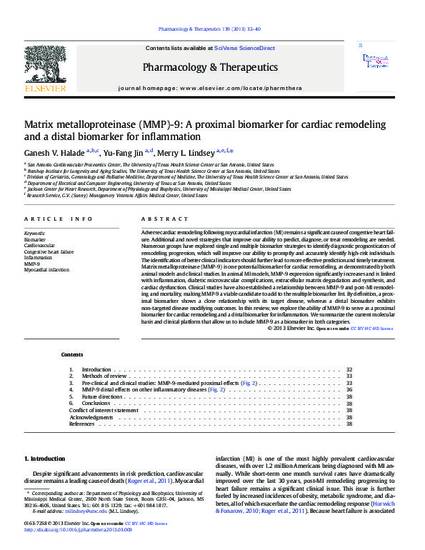
- fibroblast,
- inflammation,
- macrophage phenotype,
- MMP-28,
- myocardial infarction
Rationale: Matrix metalloproteinase (MMP)-28 regulates the inflammatory and extracellular matrix responses in cardiac aging, but the roles of MMP-28 after myocardial infarction (MI) have not been explored. Objective: To determine the impact of MMP-28 deletion on post-MI remodeling of the left ventricle (LV). Methods and Results: Adult C57BL/6J wild-type (n=76) and MMP null (MMP-28, n=86) mice of both sexes were subjected to permanent coronary artery ligation to create MI. MMP-28 expression decreased post-MI, and its cell source shifted from myocytes to macrophages. MMP-28 deletion increased day 7 mortality because of increased cardiac rupture post-MI. MMP-28 mice exhibited larger LV volumes, worse LV dysfunction, a worse LV remodeling index, and increased lung edema. Plasma MMP-9 levels were unchanged in the MMP-28 mice but increased in wild-type mice at day 7 post-MI. The mRNA levels of inflammatory and extracellular matrix proteins were attenuated in the infarct regions of MMP-28 mice, indicating reduced inflammatory and extracellular matrix responses. M2 macrophage activation was impaired when MMP-28 was absent. MMP-28 deletion also led to decreased collagen deposition and fewer myofibroblasts. Collagen cross-linking was impaired as a result of decreased expression and activation of lysyl oxidase in the infarcts of MMP-28 mice. The LV tensile strength at day 3 post-MI, however, was similar between the 2 genotypes. Conclusions: MMP-28 deletion aggravated MI-induced LV dysfunction and rupture as a result of defective inflammatory response and scar formation by suppressing M2 macrophage activation.
Circulation Research, v. 112, issue 4, p. 675-688
Available at: http://works.bepress.com/ganesh-halade/56/